What is it?
Polycystic Ovary Syndrome (PCOS) is a common hormonal and metabolic disorder affecting women of reproductive age. It is characterised by a wide range of symptoms that can vary greatly among individuals. PCOS can develop at any time after puberty and before menopause.
Are My Symptoms Caused by PCOS?
Having ovarian cysts does not necessarily mean you have PCOS. Ovarian cysts are fluid- or solid-filled sacs that do not contain eggs, whereas PCOS involves multiple small follicles (small round fluid-filled sacs containing immature eggs) that ovulate irregularly.
PCOS symptoms can start with the onset of menstruation or appear later, often triggered by weight gain. Symptoms can vary widely, and there is no single test to diagnose PCOS. Diagnosis typically involves having at least two of the following signs:
A pelvic ultrasound showing specific ultrasound features
Irregular menstrual cycles (more than 35 days between periods)
Excess facial and body hair, severe acne, and partial or complete hair loss on the scalp (androgenetic alopecia)
These symptoms tend to worsen in overweight or obese women.











